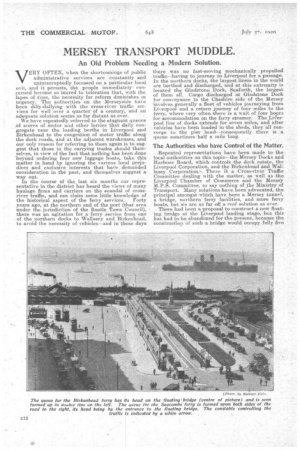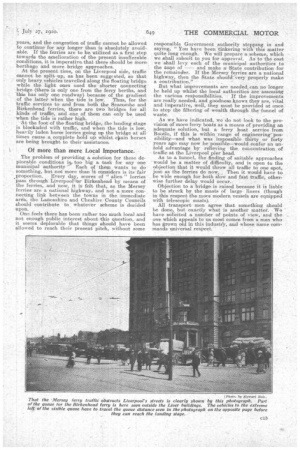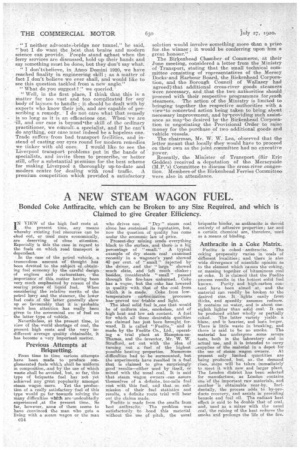MERSEY TRANSPORT MUDDLE.
Page 10

Page 11

Page 12

If you've noticed an error in this article please click here to report it so we can fix it.
An Old Problem Needing a Modern Solution.
VERY OFTEN, when the shortcothings of public administrative services are constantly and uninterruptedly focussed on a particular local evil, and it persists, the people immediately' concerned become so inured to toleration that, with the. lapse of time, the necessity for reform diminishes in urgency. The authorities on the Merseyside have been dilly-dallying with the cross-river traffic services for well over a quarter of a century, and an adequate solution seems as far distant as ever.
We have repeatedly referred to the stagnant queues
• .of scores of motor and other lorries that daily con' gregate near the loading berths in Liverpool and Birkenhead to the congestion of motor traffic along the dock roads, and at the adjacent warehouses, and our only reason for referring to them again is to suggest that those in the carrying trades should themselves, in view of the fact that nothing has been done 'beyond ordering four new luggage bo-ats' take this matter in hand by ignoring the various local prejudices and exclusive interests that haVe demanded consideration in the past, and themelves•.suggest a way out.
• In the course of the last six months our representative in the district has heard the views of many haulage firms and carriers on the scandal of crossriver traffic, and can claim some little kno-wledge of the historical aspect of the ferry services. Forty years ago, at the northern end of the port (that area under the jurisdiction of the Bootle Town Council), there was an agitation for a ferry service from one of the northern docks to Wallasey and Birkenhead, to avoid the necessity of vehicles-and in those days there was no fast-moving mechanically propelled traffic—having to journey to Liverpool for a passage. in the northern docks, the largest liners in the world are berthed and discharged, and at this extremity is located the Gladstone Dock, Seaforth, the largest of them all. Cargo discharged at Gladstone Dock for conveyance to the Cheshire side of the Mersey involves generally a fleet of vehicles journeying from Liverpool and a return journey of four miles to the ferry, where very often, there is a wait of four hours for accommodation on the ferry steamer. The .LiNierpool line of docks extends for seven miles, and after vehicles have been loaded in•the sheds, they all converge to the per head:—consequently there is a queue sometimes 'half a mile long. .
The Authorities who have Control of the Matter.
/Repeated repreg-entations have. been made to the . local authorities on this topic—the Mersey Docks and Harbour Board, which controls the dock estate, the Liverpool Corporation, and the Birkenhead and War la-soy Corporation. There A. a Cross-river Traffic Committee dealing with the matter, as well as the Liverpool Chamber of Oemmerce and the Mersey M.P.S. Committee, to say nothing of the Ministry of Transport. Many solutions have been advocated, the .principal amongst which, have. been a Mersey tunnel, a bridge, northernferry facilities, and more ferry. boats, butwe are as far off a real solution as ever.
There had been a proposal to construct a new floating bridge at the Liverpool landing stage, but this has had to be abandoned for the present, because the construction of such a .bridge would occupy fully five years, and the congestion of traffic cannot be allowed to continue for any longer than is absolutely avoidable. If the ferries are to be utilized as a first step towards the amelioration of the present insufferable conditions, it is imperative that there should be More berthage and more bridge approaches. At the present time, on the Liverpool side, traffic cannot be split up, as has been suggested, 60 that only heavy vehicles travelled along the floating bridge while the light ones used. the shorter connecting bridge (there is only one from the ferry berths, and this has only one roadway) because of the gradient of the latter when the tide is low. Thus, for the traffic services to and from bath the Sea,combe and Birkenhead ferries, there are two bridges for all kinds of traffic, an one of them can only be used • when the tide is rather high. At the foot of the floating bridge, the landing stage is blockaded with traffic, and when the tide is low, heavily laden horse lorries going up the bridge at all times cause complete hold up whilst giain horses are being brought to their 'assistance.
Of more than mere Local Importance.
The problem of providing a solution for these de plorable conditions too big a task for any one municipal authority Each of them wants to do something, but not more than -it considers is its fair ,proportion. Every day, scores of " alien" lorries pass through Liverpool or Birkenhead by means of the ferries, and now, it is felt that, as the Mersey ferries are a national highway, and not a mere connecting link between the towns in the immediate ar4a, the Lancashire and Cheshire County Councils should contribute to whatever scheine is decided upon. One feels there has been rather too much local and not enough public interest about this question,and it seems deplorable that things should have been allowed to reach their present pitch, without some. responsible Government authority stepping in and saying, "You have been tinkering with this matter quite long enough. We will prepare a scheme, which we shall submit to you for approval. As to the cost we shall levy each of the municipal authorities to the tune of and make a State contribution for the remainder. If the Mersey fries are a national highway, then the State should very properly make a contribution."
But what improvements are needed can. no longer be held up whilst the local authorities are assessing the various responsibilities. If the improvements are really needed, and goodness knows they are, vital and imperative, well, they must be provided at once to stop the filtering of wealth through the' funnel of waste, .
As we have indicated, we do not look to the provision of.more ferry boats as a means of providing an adequate solution, but a ferry boat service from Bdotle., if this is within range of engineering-possibility—and what was impossible thirty or forty years ago may now be possible—would confer an untold advantage by relieving the concentration of traffic at the Liverpool pier head.
As to a 'tunnel,. the finding of suitable approaches would be a matter of difficulty, and is open to the objection that it would throw all traffic to one spot, just as the ferries do now. , Then it would have to be wide enough for both Slow and fast traffic, otherwise further delay would occur. Objection to a bridge is raised because it iS liable to be struck by the masts of large liners (though in this respect the more modern vessels are equipped with telescopic masts). All transport men agree that something should be done, but exactly what is another matter. We have solicited a number of points of view, and the one which appeals to us most comes from a man who has grown old in this industry, and whose name com mands universal respect.
" I neither advocateAridge nor tunnel," he said, "but I do want the best that brains and modern science can provide. People stand aghast when the ferry services are discussed, hold up their hands and say something must be done, but they don't say What.
• "I don'tthelieve, in Alin° Domini 1920, we have
• reached finality in engineering skill ; as a matter et fact I don'.t believe we ever shall, and would like to see this question tackled from a new ,angle." "What do you suggest? ',' we queried."
" Well, in the first. pace, I think that this is a matter far too vast and too complicated for any body of laymen to handle ; it should be dealt with by experts who know their job, and are capable of prescribing a remedy. I do not care what that remedy is so long as it is an efficacious one. When we are -ill, and our case is beyondlthe skill of the ordinary practitioner, we co,s,ult., a specialist, and if he can't do anything, our case must indeed be a hopeless one. Trade suffer from bad transportfacilities, and instead of casting our eyes round for tnodern remedies we tinker with old ones. I would like to see the Liverpool transport problems put in the hands of specialists, and invite them to P.rescribe, .or better still, offer a substantial premium for the best scheme for making Liverpool a thoroughly up-to-date and modern centre for dealing With road traffic. A premium competitian which provided a satisfactory
solution would involve something more than a prize for the winner ; it would be conferring upon him a great honour." The Birkenhead Chamber of Commerce, at their June meeting, considered a letter from the Ministry of Transport, stating that the small technical cam
mitten consisting of repreisentatives of the Mersey Docks and Harbour Board, the Birkenhead. Corporation, and the Borough Council of Wallasey had agreedTethat additional cross-river goods steamers Were necessary, and that the two authorities should proceed with their respective programmes for tsuch steamers. The action of the Ministry is limited to bringing together the respective authorities with a view.to concerted action being taken to bring about necessary improvement, and brproviding such assistance as marbe desired by the Birkenhead Corporation in: negotiating the Provisional Order to raise money for the purchase of two-additional goods and vehicle vessels.
The chairman, Mr. W. W. Lea, observed that the letter meant that locally they would have to proceed on their own as the joint committee had no executive power.
Recently, the Minister of Transport (Sir Eric Geddes) received a deputation of the Merseyside (M.P.'s).Comtnittee to discuss the cross-river congestion. Members-of the Birkenhead Ferries Committee were also. in attendance.




























